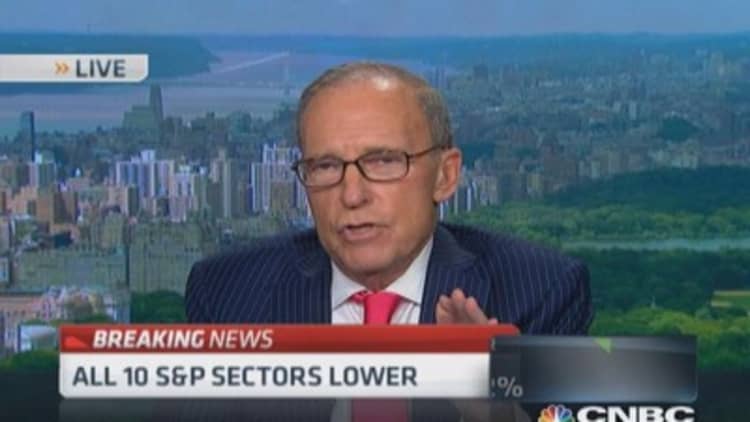Your kitchen needs a face lift. You're planning to start a business. Or you're saddled with high-interest credit card debt in the wake of a medical crisis.
Reason enough to borrow from your 401(k) retirement plan?
Generally speaking, no, said Tara Scottino, a certified financial planner with True North Advisors.
"Taking a loan from your 401(k) is normally a last resort reserved for emergencies," she said, noting those considering such a move must learn to separate wants from needs. "We try to work with clients to establish an emergency fund so they never have to use their retirement savings.
"We also look at what other sources of savings they have and whether any other, more favorable loans exist elsewhere," she added.
Read MoreUp your Social Security savvy
Home improvement stores, for example, frequently offer zero-interest loans to customers for the purchase of major appliances and renovation projects. Likewise, health-care providers are often willing to work with patients to establish a low-interest payment schedule for overdue medical bills.
Other sources of capital may include home-equity loans and lines of credit for homeowners, which keep your retirement savings intact, said Scottino.
It's worth noting that many 401(k) plans provide for hardship distributions, allowing account holders who can demonstrate proof of need to take a penalty-free withdrawal before age 59½ for costs related to unreimbursed medical expenses, the purchase of a principal residence, payment of college tuition and related educational costs, payments necessary to prevent eviction, funeral expenses and repairs of damage to their principal residence.
Such withdrawals, however, are not considered a loan. Once that money is removed, you do not have the chance to repay it, and you lose forever the tax advantage of those funds. As such, financial advisors typically recommend that retirement savers utilize every other tool available, including personal loans and the 401(k) loan.
Think ahead
Charles Sachs, a certified financial planner with Private Wealth Counsel, agreed that long-term savers should view their retirement accounts as an "iron vault."
"You can't borrow from Social Security, and you shouldn't borrow from your 401(k)," he said, noting that undersaving is a national epidemic.
Parents, in particular, often make the mistake of compromising their nest egg to help their children buy a home or pay off college debt, Sachs said. Big mistake.
"If 80-year-old you could have a conversation with 40-year-old you, you would ask yourself what you were thinking," he said, explaining that kids can secure student loans and grants, but no one doles out scholarships for retirement. "So now you've lost out on years' worth of compounded growth and you're eating beans out of a can."
Yet about 1 in 5 (21 percent) employees with a 401(k) plan offering loans borrowed from their plan in 2012, with an average unpaid balance of $7,153, according to the Employee Benefit Research Institute.
They're not all committing a blunder, said Ken Waltzer, a CFP with KCS Wealth Advisory, who suggests there are specific circumstances for which it might be permissible to borrow from your nest egg, as long as you know the risks.
According to him, "401(k) loans make sense when used for a specific purpose and when there is a plan to pay them back."
That may include starting a business or covering the cost of skills training to help facilitate a job change or higher-paying position. "One of my clients recently took out a loan to help cover their expenses while they sell a second home that they had vacated," Waltzer said.
I know many of my peers say you should never touch your 401(k), but the idea that those funds are inaccessible is in many cases what prevents young people from contributing at all.Steve O'Haraprincipal with CLA Financial Advisors
Likewise, it may be prudent if you have poor credit and are unable to obtain personal loans at competitive rates, since 401(k) plan borrowers pay themselves back with interest, he said.
People should first explore why their credit score is low, however, and whether taking out a 401(k) loan would merely delay fixing the problem. "In such a case, it's even more important to put the money to good use and have a repayment plan ahead of time," Waltzer said.
Read More401(k) pension rollovers secured
In today's real estate market, where home prices remain favorable and mortgage rates historically low, Steve O'Hara, a CFP and principal with CLA Financial Advisors, said you can also make a case for borrowing 401(k) plan funds to finance a down payment on a new home. In fact, he's done it himself—twice.
"I know many of my peers say you should never touch your 401(k), but the idea that those funds are inaccessible is in many cases what prevents young people from contributing at all," he said. "Flexibility gives them an incentive and helps establish a habit of saving."
Face the consequences
Not every employer allows for 401(k) loans, but those that do typically require borrowers to repay their loan within five years. Many, however, extend the repayment term to 10 years if the proceeds are used to purchase a primary home.
"The fact is that homeownership is so attractive right now versus renting that it could make sense to borrow from your 401(k) if it helps you invest in a home," O'Hara said.
Just be sure you understand the potential consequences.
Failure to repay your 401(k) loan on time, for example, means any unpaid balance on your loan will be treated as a distribution, subject to federal and state taxes and hit with a 10 percent early withdrawal penalty if you're younger than 59½.
Read MoreWhen to tap a 401(k)—or not
If you lose or leave your job, you will also generally be required to repay your loan in full within 60 days—or, again, the unpaid balance will be subject to taxes and a potential penalty.
Thus, it's important to ensure your job is secure—and that no layoffs are pending—before you sign on the dotted line.
Remember, too, that you may not be able to borrow as much as you think.
Loans are generally limited to $50,000 or one half of your vested plan benefits (your contributions and vested employer-match contributions), whichever is smaller.

It's worth noting, also, that you repay your 401(k) loan with after-tax dollars. And then you pay taxes on those funds again when you withdraw them at retirement.
Perhaps the biggest downside, however, is the opportunity cost of taking your money out of the market, Sachs said.
By keeping your savings on the sidelines for even a few years, you deny those dollars the benefit of tax-deferred growth, which significantly reduces the size of your future nest egg—doubly so if you fail to put new money into your 401(k) while you repay your loan.
A 2014 Fidelity Investments study estimated that a 25-year-old who earns $50,000 a year and defers 10 percent annually in a traditional 401(k) would amass a balance of $537,000 at retirement, providing roughly $2,650 in monthly retirement income.
Not a checking account
Her same-aged peer with an identical income and savings rate, who takes a 401(k) loan and halts new deferrals for 10 years and then resumes his original savings rate, would be left with a balance at retirement of $396,000—producing an estimated monthly income of $1,960, or $690 less per month than the employee who kept up with her contributions.
It may be tempting to tap your nest egg for supplemental cash when the bills pile up, but 401(k)s are not a checking account.
Read MoreInvest in 401(k) plans wisely
Retirement savings of any kind should only be used for emergencies—as in, you can't pay your heating bill.
If you do decide to borrow to cover the cost of career training or a down payment on a home, do so only after careful consideration of every other funding source, and be prepared to pay it back as quickly as possible.
Sachs at Private Wealth Counsel reminds savers that those who reach their retirement goals don't rob themselves. Instead, they live within their means and forgo instant gratification. Long-term financial security is their reward.
"When you're trying to lose weight, you eat less and exercise more," he said. "Economics are the same: You need to learn to spend less and broaden your skill set to enhance your earnings potential."




